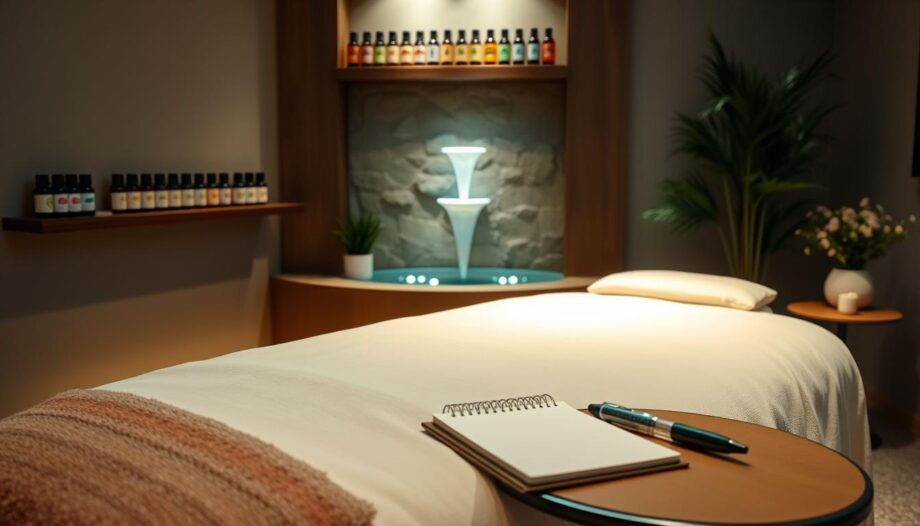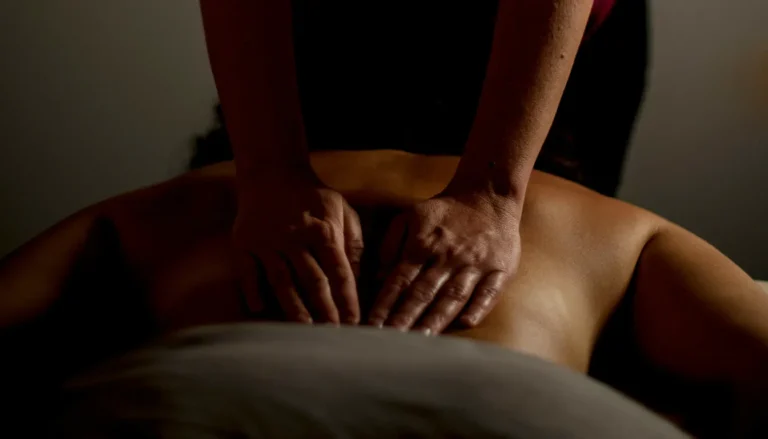Before you start your massage therapy journey, talking to your therapist is key. Asking good questions makes your massage better. Therapists at Northwest Massage Therapy, with their 20 years of experience, adjust treatments to what you like1. Studies show that 60% of people want to ease muscle pain2. With different methods offered, you can choose what suits you best3.
Openly talking about what you expect helps create a caring place. Your health and comfort get the focus they deserve. This guide will tell you what to ask your massage therapist for a great session.
Understanding the Importance of Communication
Talking with a massage therapist is key to a great session. Most clients like quiet during their massage, desiring peace above all4. Yet, speaking up about what you need is crucial. It makes it easier for you to let your therapist know your likes and worries. This trust helps both of you work together better.
Building Trust with Your Therapist
Having trust makes the therapy more effective. Sharing health details might feel odd at first5. But it’s necessary for a secure space. Therapists aim to grasp what you hope to get from the session. Good communication about expectations and comfort helps a lot. Nearly all therapists check in during the massage to ensure satisfaction4. This habit makes the results much better.
Empowering Yourself Through Knowledge
Being informed means you’re involved in your care. Knowing the types of massage, like Swedish or Deep Tissue, helps you choose rightly. Talk freely about what you want, including how hard the massage should be. This guarantees your massage matches your needs. Regular talks after sessions also improve loyalty by a lot, showing the power of continuous talks4.
Key Questions to Ask Before Booking
When you’re picking a massage therapist, it’s important to make the right choice. Asking specific questions can help you decide who to go with. You need to know about the therapist’s qualifications, the massage types they offer, and if they can tailor the massage for you.
What Are Your Qualifications and Experience?
It’s key to understand a therapist’s qualifications and their experience. This is especially true if you have certain health conditions that could be affected by massage. In places like Minnesota, without a statewide licensing for therapists, it’s even more crucial to check their background6. The training and certifications of therapists can vary a lot. Some might only have basic training. Always ask to see their credentials. Licensed therapists should have no problem showing them to you.
What Types of Massage Do You Offer?
There are many different massage styles, from Swedish to sports massages. Knowing these can help you pick the right one for your needs. Whether you want to relax or need help with recovery, there’s a style for you. But, remember, the sensation can change a lot between types, affecting your experience7. Larger chains offer booking convenience but may have you see various therapists. Smaller practices usually have the same therapist for you each time6.
How Can You Customise the Massage to Suit My Needs?
Having a massage customised for you is key for comfort and to address any issues. Tell your therapist about any areas of discomfort or if there’s a specific pressure you like. They value feedback during your session, so don’t hesitate to speak up if you’re not comfortable. This helps them adjust the massage to suit you better7. Some people might get light headaches or occasional bruising after a massage. Making sure the massage meets your expectations is important for a good therapy experience.
What to Expect During Your Massage Session
Getting to know how a massage session works can make you feel more at peace. This is key if it’s your first time. A typical massage has steps that help you relax and pay attention to where you’re tense. It lasts from half an hour to 90 minutes, based on what kind you get. This info sets up what you think will happen and helps you get the most out of it. Talking to your therapist about what you need makes sure the massage fits your health goals.
How Will the Session Be Structured?
First off, your session will start with a quick chat. You’ll talk about what you need and your health. Then, you’ll get a massage for about an hour that helps you chill out. It focuses on tense spots like your neck and shoulders. You’ll undress as much as you’re okay with, then get on the table under a clean sheet. This keeps you comfortable and private during the massage. Many say they feel really relaxed afterward. It shows why knowing what happens in a massage is important8.
What Should I Wear During the Massage?
Choosing what to wear for a massage is about comfort and moving easily. Therapists respect your privacy and will cover you right, whether you wear little or keep some clothes on. Good choices include shorts, a sports bra, or something loose-fitting. The main thing is you should feel safe and comfy. This lets you fully relax and enjoy the massage.
Your choices on clothing and getting ready play a big part in your massage experience. Talking with your therapist helps you enjoy and be happy with the session910.
Questions to Ask About Products and Techniques
Understanding what your therapist will use helps improve your experience. It’s crucial that the massage products meet your skin’s needs, especially if you have sensitive skin or allergies. Talk with your therapist about the products they choose.
What Products Will Be Used on My Skin?
It’s important to ask about the massage products that will be used. This helps to see if they’re right for your skin during a massage. Therapists use various oils, creams, and lotions for different skin types. Be sure to mention any allergies and ask about organic or hypoallergenic options. Finding out if they use aromatherapy oils can also make your massage better.
What Techniques Will You Implement?
Asking about the massage techniques your therapist will use is key. This question lets you know how they’ll make the session fit your needs. Maybe you want to ease tension or simply relax. It’s good to know since people have different levels of sensitivity. Some might feel ticklish or discomfort during a massage. Many people even fall asleep during their session, showing how relaxing these techniques can be11.
Some clients might notice bruising after a massage because of how their body reacts to the pressure. This info helps you know what to expect later. It also makes it easier to talk about any discomfort during your treatment12.
Questions to Ask During the Session
Talking to your massage therapist is essential for a comfortable experience. It’s good to ask how they like to get your feedback. You can use words or simple signs to communicate. This helps you let them know about the massage pressure and your comfort level7.
Therapists are open to hearing your thoughts. They often change their method based on your input. This fact is supported by studies7.
Knowing how to speak up when you’re uncomfortable is key. Don’t hesitate to express any concerns. Your therapist will help by changing the pressure or techniques. They aim to keep you comfortable throughout your massage13.
Making sure you are cozy during the massage is crucial for its benefits. Being open and sharing your needs enhances your massage experience. It makes every session valuable and enjoyable14.
FAQ
What questions should I ask a massage therapist before my first session?
A: Ask about their skills, what massages they offer, and if they can tailor the session for you.
How important is communication with my massage therapist?
Good communication builds trust. It helps make your massage exactly what you need.
What qualifications should I look for in a massage therapist?
Check for certificates from well-known schools. Make sure they know the massage type you want. This shows they’re skilled.
What types of massages do therapists typically offer?
Therapists provide many massages, like Swedish and deep tissue. Know what you want to make a good choice.
How can my massage be customised to suit my needs?
Therapists can change techniques to help with your specific issues. This makes your massage just right for you.
What should I expect regarding the structure of my massage session?
Learn how long and what happens in your session ahead of time. This lets you relax more during the massage.
What should I wear during the massage?
Talk to your therapist about what to wear. They keep you covered and comfortable no matter what.
What products will be used on my skin during the massage?
Ask what they’ll use on your skin. This is important if you’re allergic or have sensitive skin.
What techniques will you implement during the massage?
Ask about the massage techniques they’ll use. It helps to know how they’ll address your needs.
How can I provide feedback during the massage?
Find out how to let them know if you need more or less pressure. It’s key to a great massage.
What should I do if I feel uncomfortable during the session?
Learn what to do if something’s not right. It’s important your therapist can make changes to help you feel better.





